Organisational Behaviour Report: Barclays - Culture, Motivation, Teams
VerifiedAdded on 2022/12/27
|16
|4728
|84
Report
AI Summary
This report provides an analysis of organisational behaviour, focusing on the case study of Barclays. The report explores how organisational culture, politics, and power influence individual and team behaviour and performance. It delves into various motivational theories, including content and process theories, such as Maslow's Hierarchy of Needs and Vroom's Expectancy Theory, and how they enable effective goal achievement within the organisation. Furthermore, the report examines the characteristics of effective versus ineffective teams. Finally, the report applies concepts and philosophies of organisational behaviour to the context of Barclays, considering a given business situation. The report concludes with a summary of the key findings and insights regarding organisational behaviour within the chosen company.
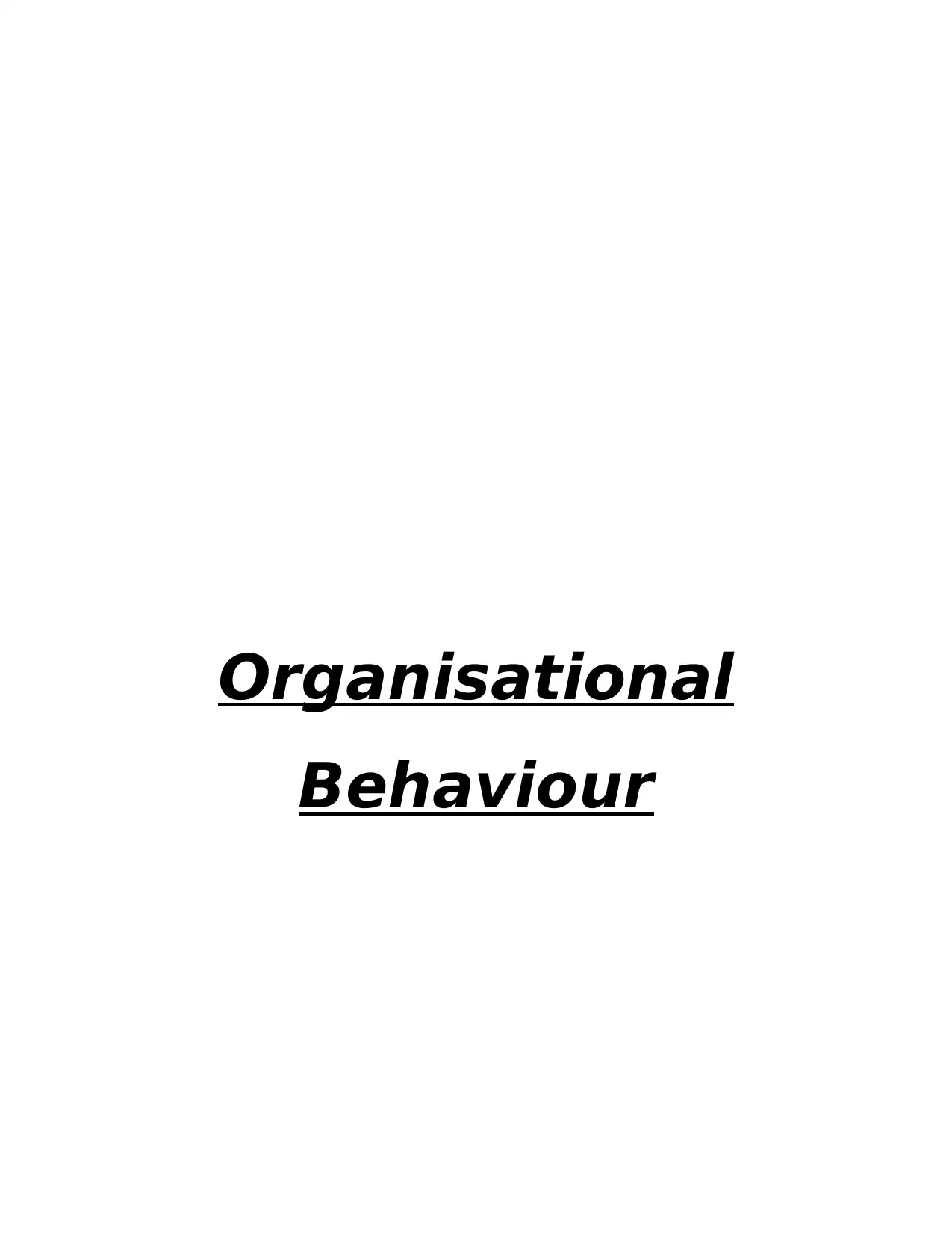
Organisational
Behaviour
Behaviour
Paraphrase This Document
Need a fresh take? Get an instant paraphrase of this document with our AI Paraphraser
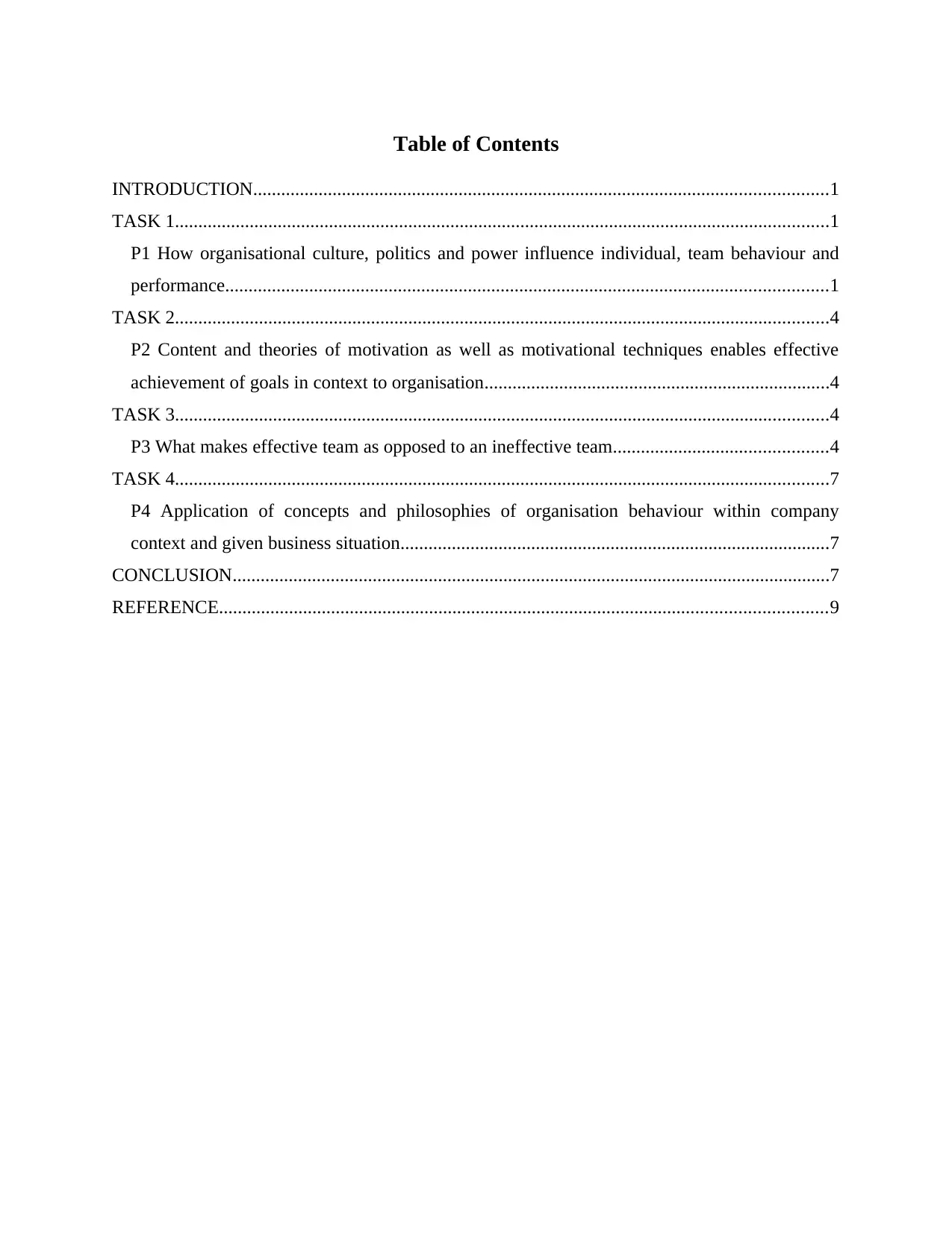
Table of Contents
INTRODUCTION...........................................................................................................................1
TASK 1............................................................................................................................................1
P1 How organisational culture, politics and power influence individual, team behaviour and
performance.................................................................................................................................1
TASK 2............................................................................................................................................4
P2 Content and theories of motivation as well as motivational techniques enables effective
achievement of goals in context to organisation..........................................................................4
TASK 3............................................................................................................................................4
P3 What makes effective team as opposed to an ineffective team..............................................4
TASK 4............................................................................................................................................7
P4 Application of concepts and philosophies of organisation behaviour within company
context and given business situation............................................................................................7
CONCLUSION................................................................................................................................7
REFERENCE..................................................................................................................................9
INTRODUCTION...........................................................................................................................1
TASK 1............................................................................................................................................1
P1 How organisational culture, politics and power influence individual, team behaviour and
performance.................................................................................................................................1
TASK 2............................................................................................................................................4
P2 Content and theories of motivation as well as motivational techniques enables effective
achievement of goals in context to organisation..........................................................................4
TASK 3............................................................................................................................................4
P3 What makes effective team as opposed to an ineffective team..............................................4
TASK 4............................................................................................................................................7
P4 Application of concepts and philosophies of organisation behaviour within company
context and given business situation............................................................................................7
CONCLUSION................................................................................................................................7
REFERENCE..................................................................................................................................9

⊘ This is a preview!⊘
Do you want full access?
Subscribe today to unlock all pages.

Trusted by 1+ million students worldwide
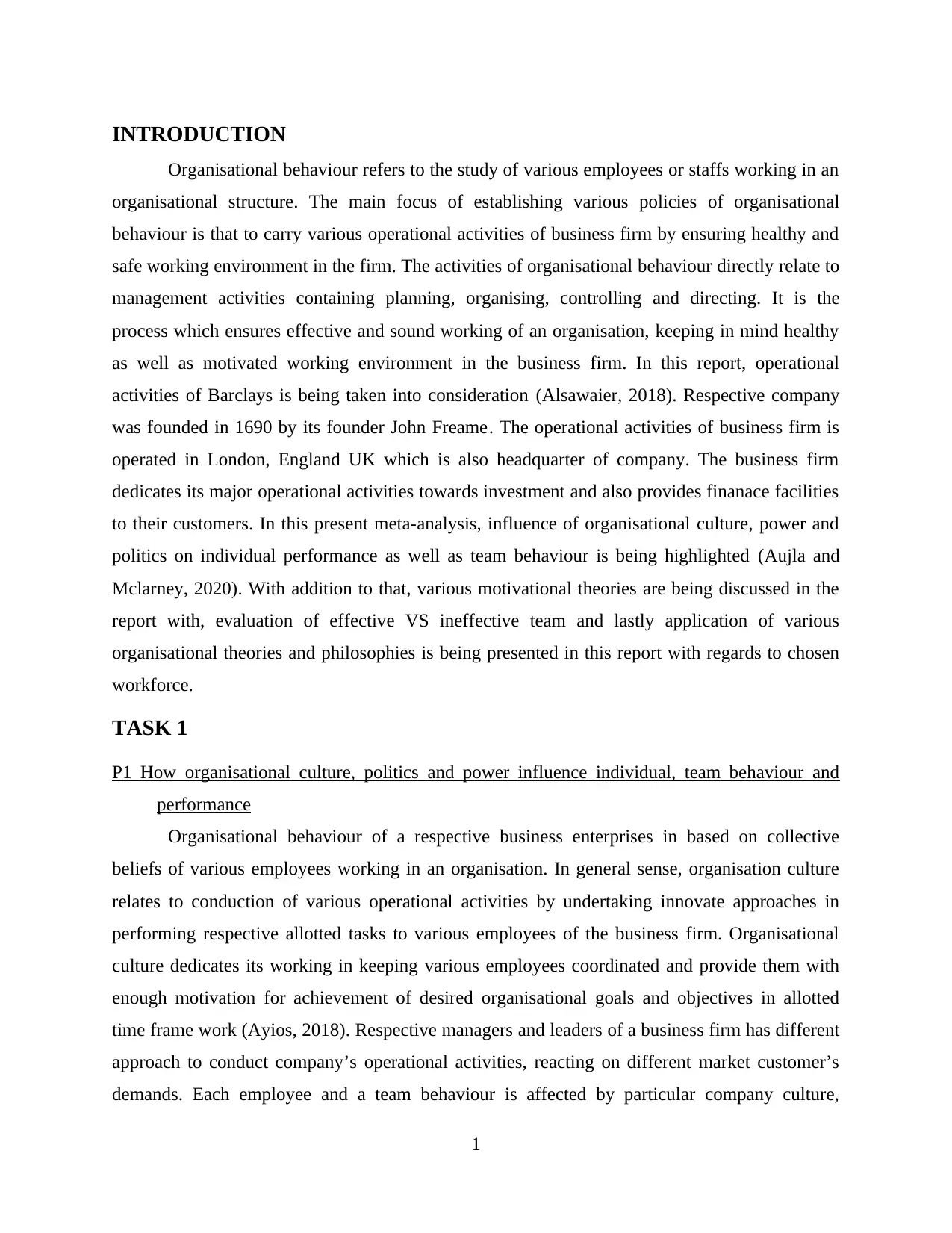
INTRODUCTION
Organisational behaviour refers to the study of various employees or staffs working in an
organisational structure. The main focus of establishing various policies of organisational
behaviour is that to carry various operational activities of business firm by ensuring healthy and
safe working environment in the firm. The activities of organisational behaviour directly relate to
management activities containing planning, organising, controlling and directing. It is the
process which ensures effective and sound working of an organisation, keeping in mind healthy
as well as motivated working environment in the business firm. In this report, operational
activities of Barclays is being taken into consideration (Alsawaier, 2018). Respective company
was founded in 1690 by its founder John Freame. The operational activities of business firm is
operated in London, England UK which is also headquarter of company. The business firm
dedicates its major operational activities towards investment and also provides finanace facilities
to their customers. In this present meta-analysis, influence of organisational culture, power and
politics on individual performance as well as team behaviour is being highlighted (Aujla and
Mclarney, 2020). With addition to that, various motivational theories are being discussed in the
report with, evaluation of effective VS ineffective team and lastly application of various
organisational theories and philosophies is being presented in this report with regards to chosen
workforce.
TASK 1
P1 How organisational culture, politics and power influence individual, team behaviour and
performance
Organisational behaviour of a respective business enterprises in based on collective
beliefs of various employees working in an organisation. In general sense, organisation culture
relates to conduction of various operational activities by undertaking innovate approaches in
performing respective allotted tasks to various employees of the business firm. Organisational
culture dedicates its working in keeping various employees coordinated and provide them with
enough motivation for achievement of desired organisational goals and objectives in allotted
time frame work (Ayios, 2018). Respective managers and leaders of a business firm has different
approach to conduct company’s operational activities, reacting on different market customer’s
demands. Each employee and a team behaviour is affected by particular company culture,
1
Organisational behaviour refers to the study of various employees or staffs working in an
organisational structure. The main focus of establishing various policies of organisational
behaviour is that to carry various operational activities of business firm by ensuring healthy and
safe working environment in the firm. The activities of organisational behaviour directly relate to
management activities containing planning, organising, controlling and directing. It is the
process which ensures effective and sound working of an organisation, keeping in mind healthy
as well as motivated working environment in the business firm. In this report, operational
activities of Barclays is being taken into consideration (Alsawaier, 2018). Respective company
was founded in 1690 by its founder John Freame. The operational activities of business firm is
operated in London, England UK which is also headquarter of company. The business firm
dedicates its major operational activities towards investment and also provides finanace facilities
to their customers. In this present meta-analysis, influence of organisational culture, power and
politics on individual performance as well as team behaviour is being highlighted (Aujla and
Mclarney, 2020). With addition to that, various motivational theories are being discussed in the
report with, evaluation of effective VS ineffective team and lastly application of various
organisational theories and philosophies is being presented in this report with regards to chosen
workforce.
TASK 1
P1 How organisational culture, politics and power influence individual, team behaviour and
performance
Organisational behaviour of a respective business enterprises in based on collective
beliefs of various employees working in an organisation. In general sense, organisation culture
relates to conduction of various operational activities by undertaking innovate approaches in
performing respective allotted tasks to various employees of the business firm. Organisational
culture dedicates its working in keeping various employees coordinated and provide them with
enough motivation for achievement of desired organisational goals and objectives in allotted
time frame work (Ayios, 2018). Respective managers and leaders of a business firm has different
approach to conduct company’s operational activities, reacting on different market customer’s
demands. Each employee and a team behaviour is affected by particular company culture,
1
Paraphrase This Document
Need a fresh take? Get an instant paraphrase of this document with our AI Paraphraser
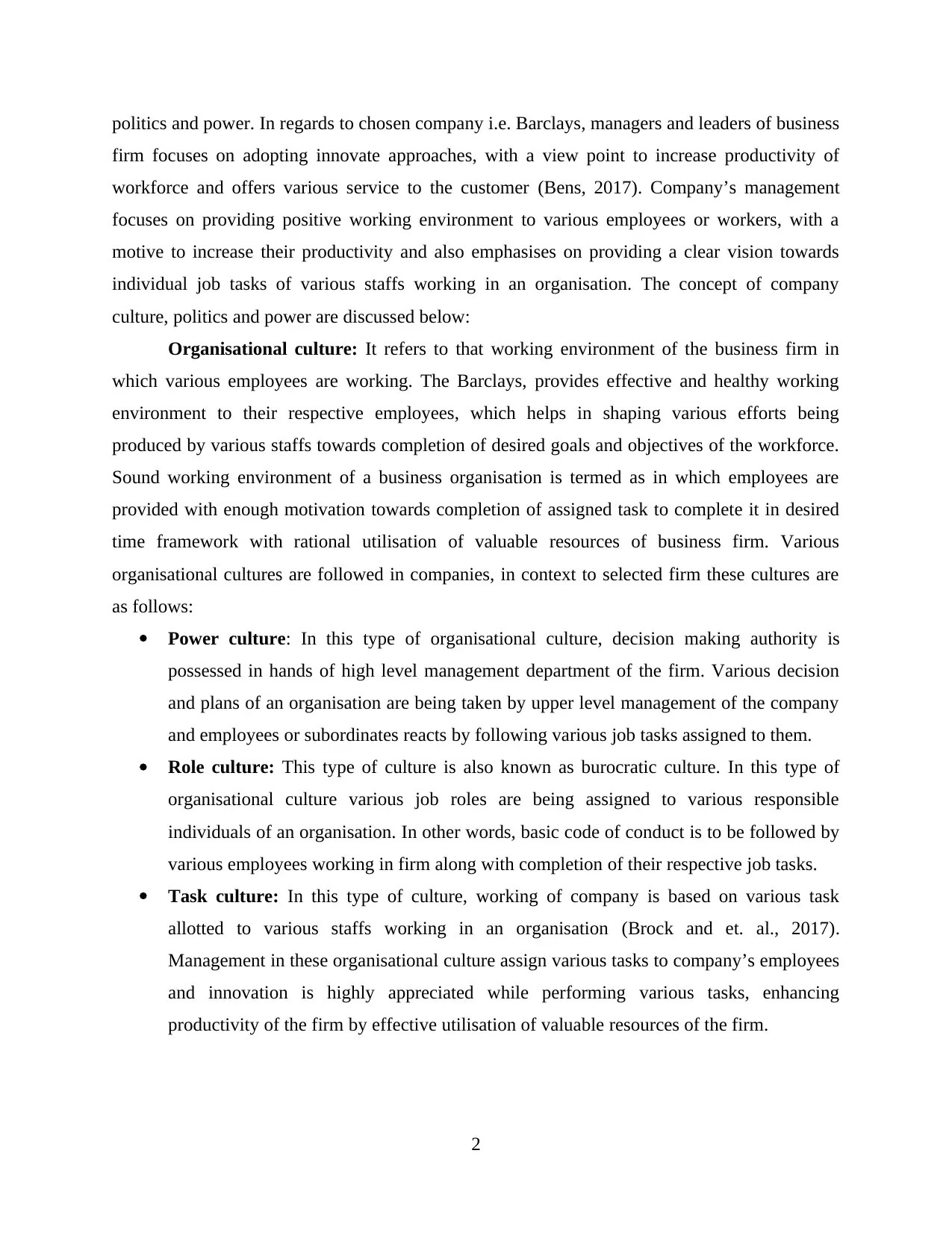
politics and power. In regards to chosen company i.e. Barclays, managers and leaders of business
firm focuses on adopting innovate approaches, with a view point to increase productivity of
workforce and offers various service to the customer (Bens, 2017). Company’s management
focuses on providing positive working environment to various employees or workers, with a
motive to increase their productivity and also emphasises on providing a clear vision towards
individual job tasks of various staffs working in an organisation. The concept of company
culture, politics and power are discussed below:
Organisational culture: It refers to that working environment of the business firm in
which various employees are working. The Barclays, provides effective and healthy working
environment to their respective employees, which helps in shaping various efforts being
produced by various staffs towards completion of desired goals and objectives of the workforce.
Sound working environment of a business organisation is termed as in which employees are
provided with enough motivation towards completion of assigned task to complete it in desired
time framework with rational utilisation of valuable resources of business firm. Various
organisational cultures are followed in companies, in context to selected firm these cultures are
as follows:
Power culture: In this type of organisational culture, decision making authority is
possessed in hands of high level management department of the firm. Various decision
and plans of an organisation are being taken by upper level management of the company
and employees or subordinates reacts by following various job tasks assigned to them.
Role culture: This type of culture is also known as burocratic culture. In this type of
organisational culture various job roles are being assigned to various responsible
individuals of an organisation. In other words, basic code of conduct is to be followed by
various employees working in firm along with completion of their respective job tasks.
Task culture: In this type of culture, working of company is based on various task
allotted to various staffs working in an organisation (Brock and et. al., 2017).
Management in these organisational culture assign various tasks to company’s employees
and innovation is highly appreciated while performing various tasks, enhancing
productivity of the firm by effective utilisation of valuable resources of the firm.
2
firm focuses on adopting innovate approaches, with a view point to increase productivity of
workforce and offers various service to the customer (Bens, 2017). Company’s management
focuses on providing positive working environment to various employees or workers, with a
motive to increase their productivity and also emphasises on providing a clear vision towards
individual job tasks of various staffs working in an organisation. The concept of company
culture, politics and power are discussed below:
Organisational culture: It refers to that working environment of the business firm in
which various employees are working. The Barclays, provides effective and healthy working
environment to their respective employees, which helps in shaping various efforts being
produced by various staffs towards completion of desired goals and objectives of the workforce.
Sound working environment of a business organisation is termed as in which employees are
provided with enough motivation towards completion of assigned task to complete it in desired
time framework with rational utilisation of valuable resources of business firm. Various
organisational cultures are followed in companies, in context to selected firm these cultures are
as follows:
Power culture: In this type of organisational culture, decision making authority is
possessed in hands of high level management department of the firm. Various decision
and plans of an organisation are being taken by upper level management of the company
and employees or subordinates reacts by following various job tasks assigned to them.
Role culture: This type of culture is also known as burocratic culture. In this type of
organisational culture various job roles are being assigned to various responsible
individuals of an organisation. In other words, basic code of conduct is to be followed by
various employees working in firm along with completion of their respective job tasks.
Task culture: In this type of culture, working of company is based on various task
allotted to various staffs working in an organisation (Brock and et. al., 2017).
Management in these organisational culture assign various tasks to company’s employees
and innovation is highly appreciated while performing various tasks, enhancing
productivity of the firm by effective utilisation of valuable resources of the firm.
2
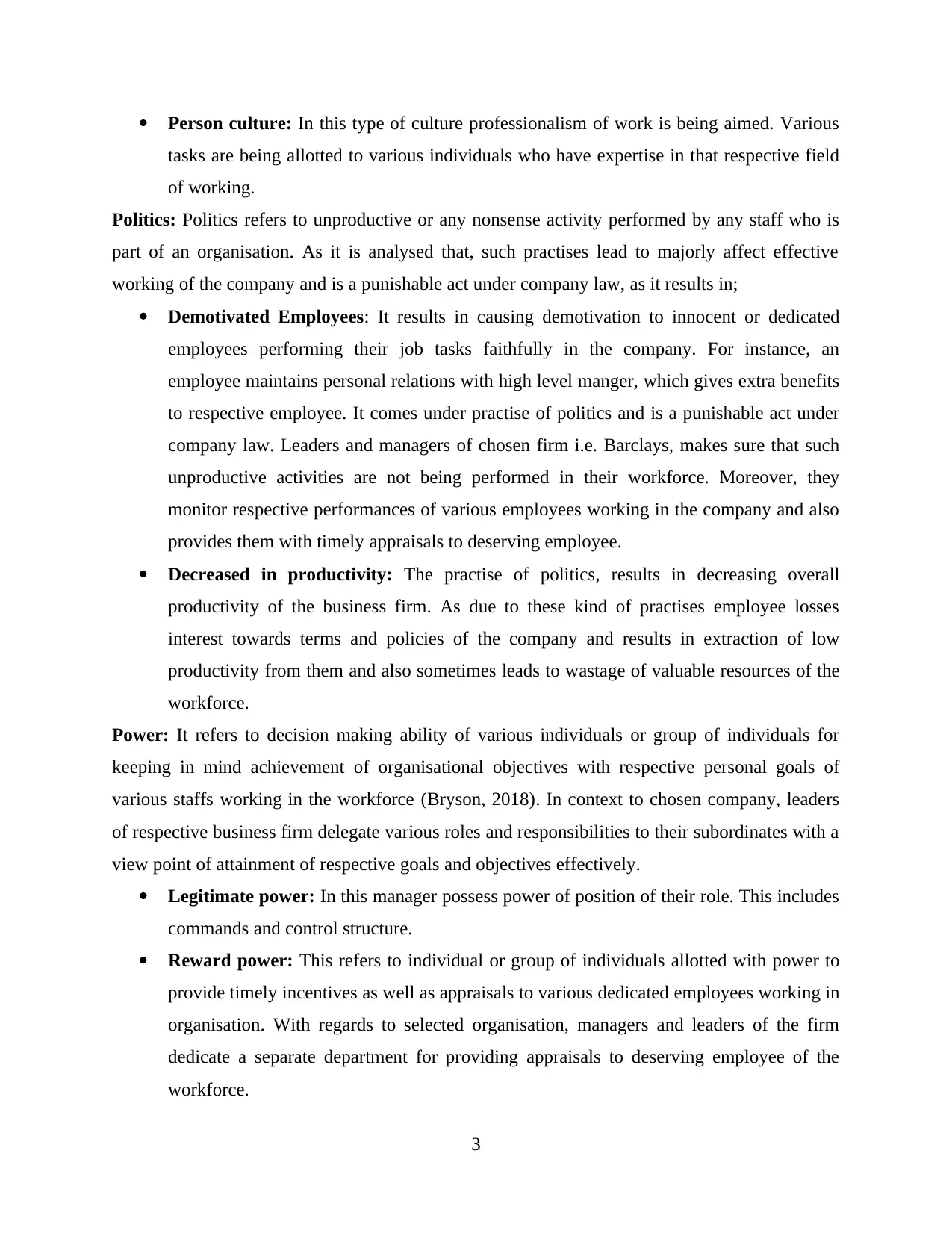
Person culture: In this type of culture professionalism of work is being aimed. Various
tasks are being allotted to various individuals who have expertise in that respective field
of working.
Politics: Politics refers to unproductive or any nonsense activity performed by any staff who is
part of an organisation. As it is analysed that, such practises lead to majorly affect effective
working of the company and is a punishable act under company law, as it results in;
Demotivated Employees: It results in causing demotivation to innocent or dedicated
employees performing their job tasks faithfully in the company. For instance, an
employee maintains personal relations with high level manger, which gives extra benefits
to respective employee. It comes under practise of politics and is a punishable act under
company law. Leaders and managers of chosen firm i.e. Barclays, makes sure that such
unproductive activities are not being performed in their workforce. Moreover, they
monitor respective performances of various employees working in the company and also
provides them with timely appraisals to deserving employee.
Decreased in productivity: The practise of politics, results in decreasing overall
productivity of the business firm. As due to these kind of practises employee losses
interest towards terms and policies of the company and results in extraction of low
productivity from them and also sometimes leads to wastage of valuable resources of the
workforce.
Power: It refers to decision making ability of various individuals or group of individuals for
keeping in mind achievement of organisational objectives with respective personal goals of
various staffs working in the workforce (Bryson, 2018). In context to chosen company, leaders
of respective business firm delegate various roles and responsibilities to their subordinates with a
view point of attainment of respective goals and objectives effectively.
Legitimate power: In this manager possess power of position of their role. This includes
commands and control structure.
Reward power: This refers to individual or group of individuals allotted with power to
provide timely incentives as well as appraisals to various dedicated employees working in
organisation. With regards to selected organisation, managers and leaders of the firm
dedicate a separate department for providing appraisals to deserving employee of the
workforce.
3
tasks are being allotted to various individuals who have expertise in that respective field
of working.
Politics: Politics refers to unproductive or any nonsense activity performed by any staff who is
part of an organisation. As it is analysed that, such practises lead to majorly affect effective
working of the company and is a punishable act under company law, as it results in;
Demotivated Employees: It results in causing demotivation to innocent or dedicated
employees performing their job tasks faithfully in the company. For instance, an
employee maintains personal relations with high level manger, which gives extra benefits
to respective employee. It comes under practise of politics and is a punishable act under
company law. Leaders and managers of chosen firm i.e. Barclays, makes sure that such
unproductive activities are not being performed in their workforce. Moreover, they
monitor respective performances of various employees working in the company and also
provides them with timely appraisals to deserving employee.
Decreased in productivity: The practise of politics, results in decreasing overall
productivity of the business firm. As due to these kind of practises employee losses
interest towards terms and policies of the company and results in extraction of low
productivity from them and also sometimes leads to wastage of valuable resources of the
workforce.
Power: It refers to decision making ability of various individuals or group of individuals for
keeping in mind achievement of organisational objectives with respective personal goals of
various staffs working in the workforce (Bryson, 2018). In context to chosen company, leaders
of respective business firm delegate various roles and responsibilities to their subordinates with a
view point of attainment of respective goals and objectives effectively.
Legitimate power: In this manager possess power of position of their role. This includes
commands and control structure.
Reward power: This refers to individual or group of individuals allotted with power to
provide timely incentives as well as appraisals to various dedicated employees working in
organisation. With regards to selected organisation, managers and leaders of the firm
dedicate a separate department for providing appraisals to deserving employee of the
workforce.
3
⊘ This is a preview!⊘
Do you want full access?
Subscribe today to unlock all pages.

Trusted by 1+ million students worldwide
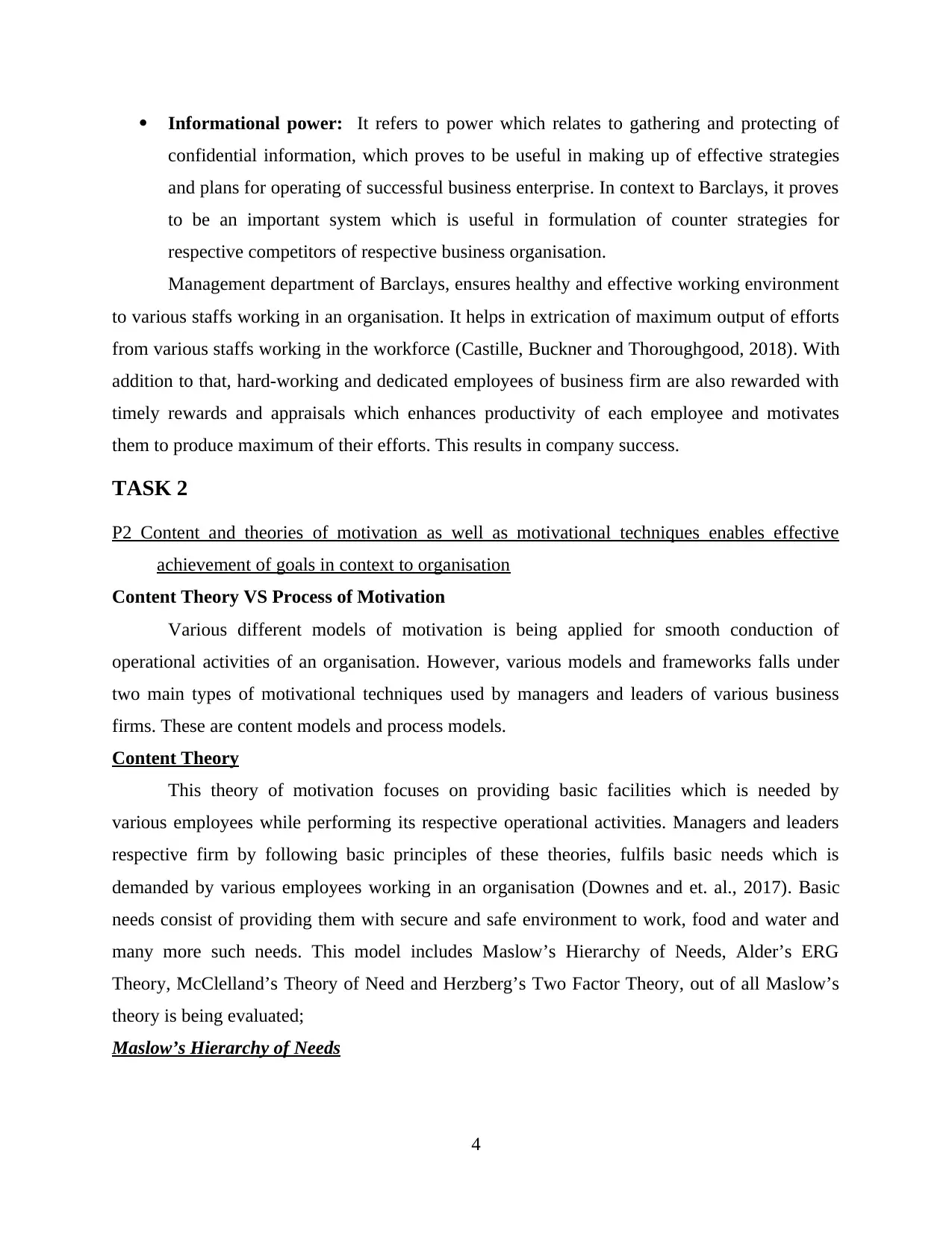
Informational power: It refers to power which relates to gathering and protecting of
confidential information, which proves to be useful in making up of effective strategies
and plans for operating of successful business enterprise. In context to Barclays, it proves
to be an important system which is useful in formulation of counter strategies for
respective competitors of respective business organisation.
Management department of Barclays, ensures healthy and effective working environment
to various staffs working in an organisation. It helps in extrication of maximum output of efforts
from various staffs working in the workforce (Castille, Buckner and Thoroughgood, 2018). With
addition to that, hard-working and dedicated employees of business firm are also rewarded with
timely rewards and appraisals which enhances productivity of each employee and motivates
them to produce maximum of their efforts. This results in company success.
TASK 2
P2 Content and theories of motivation as well as motivational techniques enables effective
achievement of goals in context to organisation
Content Theory VS Process of Motivation
Various different models of motivation is being applied for smooth conduction of
operational activities of an organisation. However, various models and frameworks falls under
two main types of motivational techniques used by managers and leaders of various business
firms. These are content models and process models.
Content Theory
This theory of motivation focuses on providing basic facilities which is needed by
various employees while performing its respective operational activities. Managers and leaders
respective firm by following basic principles of these theories, fulfils basic needs which is
demanded by various employees working in an organisation (Downes and et. al., 2017). Basic
needs consist of providing them with secure and safe environment to work, food and water and
many more such needs. This model includes Maslow’s Hierarchy of Needs, Alder’s ERG
Theory, McClelland’s Theory of Need and Herzberg’s Two Factor Theory, out of all Maslow’s
theory is being evaluated;
Maslow’s Hierarchy of Needs
4
confidential information, which proves to be useful in making up of effective strategies
and plans for operating of successful business enterprise. In context to Barclays, it proves
to be an important system which is useful in formulation of counter strategies for
respective competitors of respective business organisation.
Management department of Barclays, ensures healthy and effective working environment
to various staffs working in an organisation. It helps in extrication of maximum output of efforts
from various staffs working in the workforce (Castille, Buckner and Thoroughgood, 2018). With
addition to that, hard-working and dedicated employees of business firm are also rewarded with
timely rewards and appraisals which enhances productivity of each employee and motivates
them to produce maximum of their efforts. This results in company success.
TASK 2
P2 Content and theories of motivation as well as motivational techniques enables effective
achievement of goals in context to organisation
Content Theory VS Process of Motivation
Various different models of motivation is being applied for smooth conduction of
operational activities of an organisation. However, various models and frameworks falls under
two main types of motivational techniques used by managers and leaders of various business
firms. These are content models and process models.
Content Theory
This theory of motivation focuses on providing basic facilities which is needed by
various employees while performing its respective operational activities. Managers and leaders
respective firm by following basic principles of these theories, fulfils basic needs which is
demanded by various employees working in an organisation (Downes and et. al., 2017). Basic
needs consist of providing them with secure and safe environment to work, food and water and
many more such needs. This model includes Maslow’s Hierarchy of Needs, Alder’s ERG
Theory, McClelland’s Theory of Need and Herzberg’s Two Factor Theory, out of all Maslow’s
theory is being evaluated;
Maslow’s Hierarchy of Needs
4
Paraphrase This Document
Need a fresh take? Get an instant paraphrase of this document with our AI Paraphraser
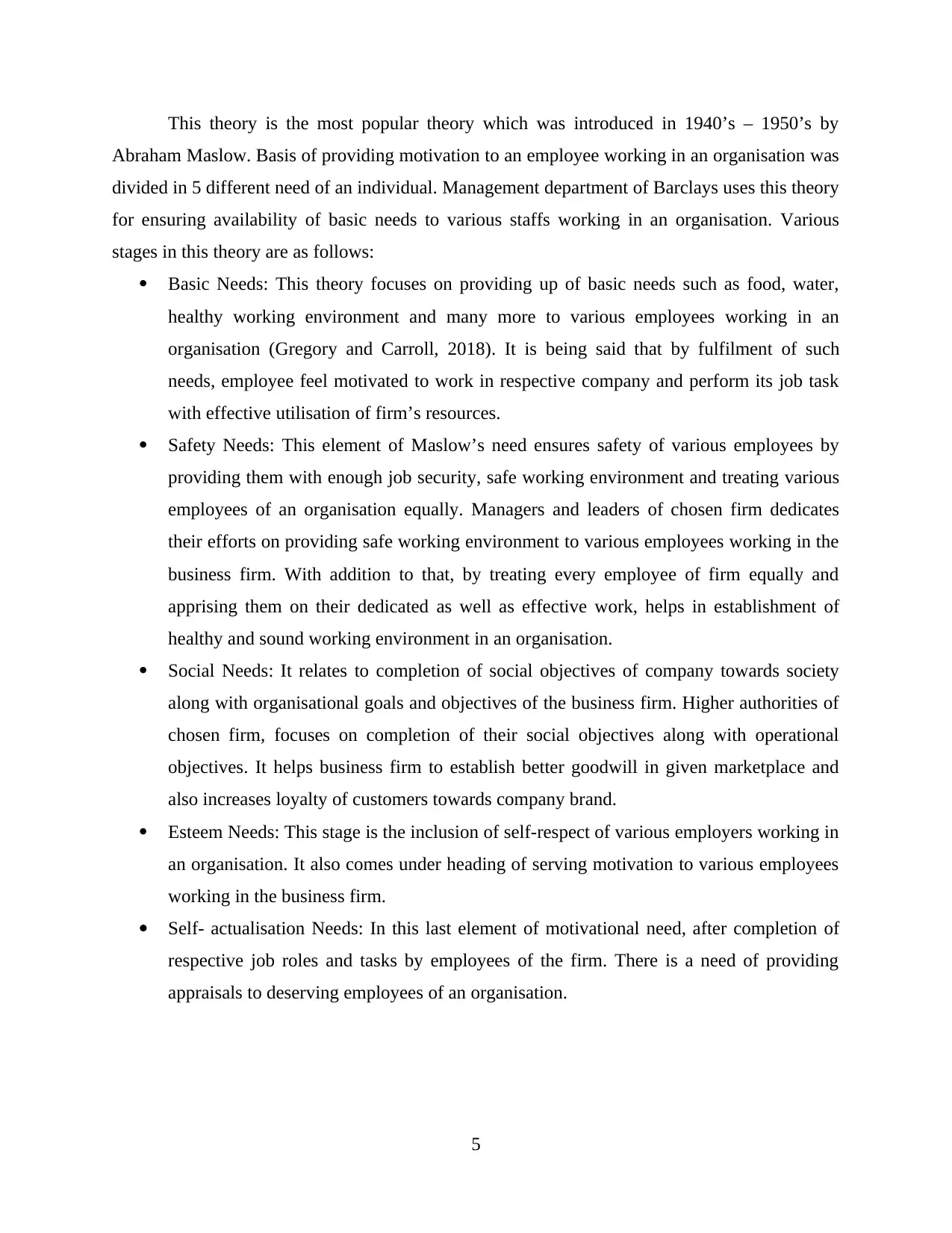
This theory is the most popular theory which was introduced in 1940’s – 1950’s by
Abraham Maslow. Basis of providing motivation to an employee working in an organisation was
divided in 5 different need of an individual. Management department of Barclays uses this theory
for ensuring availability of basic needs to various staffs working in an organisation. Various
stages in this theory are as follows:
Basic Needs: This theory focuses on providing up of basic needs such as food, water,
healthy working environment and many more to various employees working in an
organisation (Gregory and Carroll, 2018). It is being said that by fulfilment of such
needs, employee feel motivated to work in respective company and perform its job task
with effective utilisation of firm’s resources.
Safety Needs: This element of Maslow’s need ensures safety of various employees by
providing them with enough job security, safe working environment and treating various
employees of an organisation equally. Managers and leaders of chosen firm dedicates
their efforts on providing safe working environment to various employees working in the
business firm. With addition to that, by treating every employee of firm equally and
apprising them on their dedicated as well as effective work, helps in establishment of
healthy and sound working environment in an organisation.
Social Needs: It relates to completion of social objectives of company towards society
along with organisational goals and objectives of the business firm. Higher authorities of
chosen firm, focuses on completion of their social objectives along with operational
objectives. It helps business firm to establish better goodwill in given marketplace and
also increases loyalty of customers towards company brand.
Esteem Needs: This stage is the inclusion of self-respect of various employers working in
an organisation. It also comes under heading of serving motivation to various employees
working in the business firm.
Self- actualisation Needs: In this last element of motivational need, after completion of
respective job roles and tasks by employees of the firm. There is a need of providing
appraisals to deserving employees of an organisation.
5
Abraham Maslow. Basis of providing motivation to an employee working in an organisation was
divided in 5 different need of an individual. Management department of Barclays uses this theory
for ensuring availability of basic needs to various staffs working in an organisation. Various
stages in this theory are as follows:
Basic Needs: This theory focuses on providing up of basic needs such as food, water,
healthy working environment and many more to various employees working in an
organisation (Gregory and Carroll, 2018). It is being said that by fulfilment of such
needs, employee feel motivated to work in respective company and perform its job task
with effective utilisation of firm’s resources.
Safety Needs: This element of Maslow’s need ensures safety of various employees by
providing them with enough job security, safe working environment and treating various
employees of an organisation equally. Managers and leaders of chosen firm dedicates
their efforts on providing safe working environment to various employees working in the
business firm. With addition to that, by treating every employee of firm equally and
apprising them on their dedicated as well as effective work, helps in establishment of
healthy and sound working environment in an organisation.
Social Needs: It relates to completion of social objectives of company towards society
along with organisational goals and objectives of the business firm. Higher authorities of
chosen firm, focuses on completion of their social objectives along with operational
objectives. It helps business firm to establish better goodwill in given marketplace and
also increases loyalty of customers towards company brand.
Esteem Needs: This stage is the inclusion of self-respect of various employers working in
an organisation. It also comes under heading of serving motivation to various employees
working in the business firm.
Self- actualisation Needs: In this last element of motivational need, after completion of
respective job roles and tasks by employees of the firm. There is a need of providing
appraisals to deserving employees of an organisation.
5
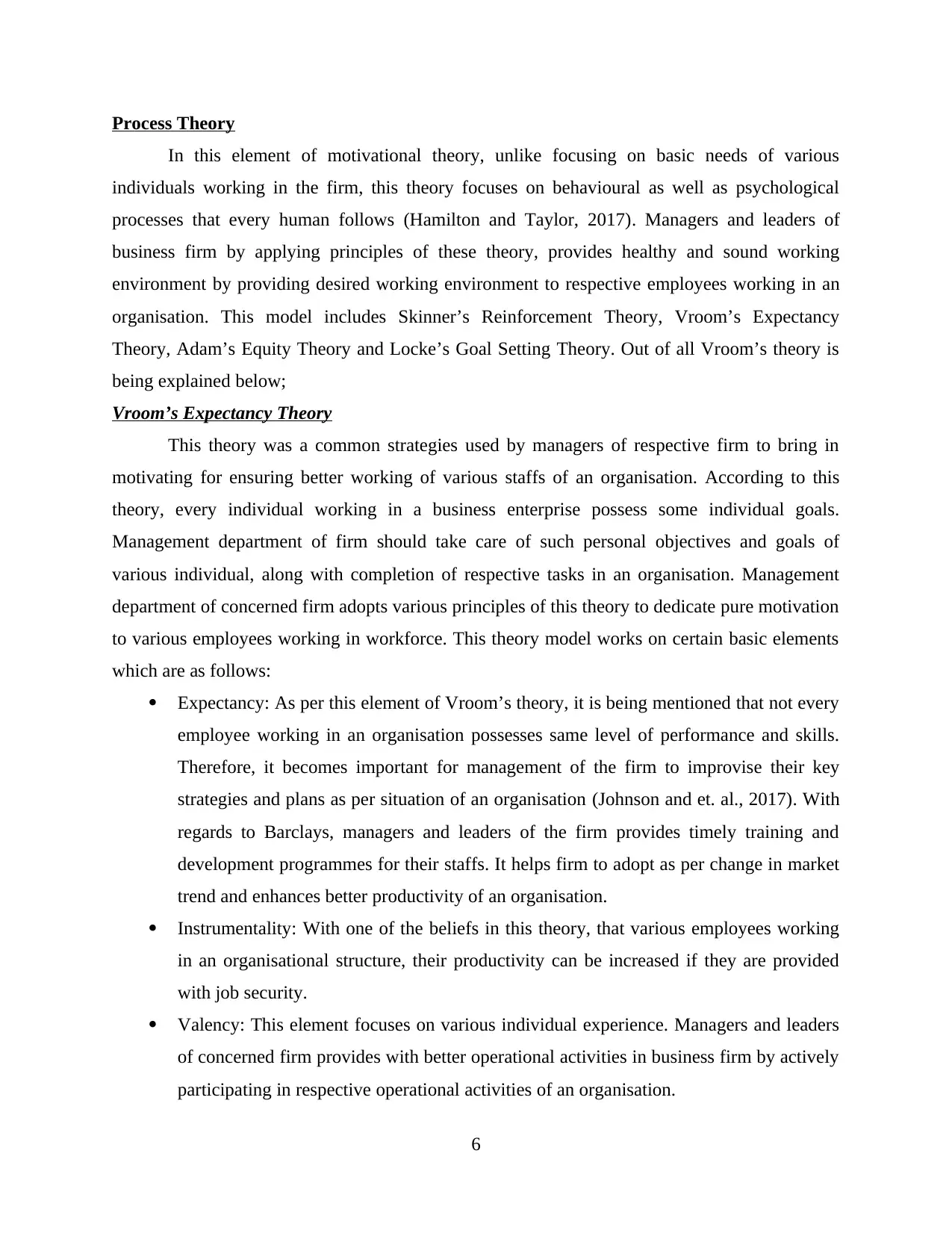
Process Theory
In this element of motivational theory, unlike focusing on basic needs of various
individuals working in the firm, this theory focuses on behavioural as well as psychological
processes that every human follows (Hamilton and Taylor, 2017). Managers and leaders of
business firm by applying principles of these theory, provides healthy and sound working
environment by providing desired working environment to respective employees working in an
organisation. This model includes Skinner’s Reinforcement Theory, Vroom’s Expectancy
Theory, Adam’s Equity Theory and Locke’s Goal Setting Theory. Out of all Vroom’s theory is
being explained below;
Vroom’s Expectancy Theory
This theory was a common strategies used by managers of respective firm to bring in
motivating for ensuring better working of various staffs of an organisation. According to this
theory, every individual working in a business enterprise possess some individual goals.
Management department of firm should take care of such personal objectives and goals of
various individual, along with completion of respective tasks in an organisation. Management
department of concerned firm adopts various principles of this theory to dedicate pure motivation
to various employees working in workforce. This theory model works on certain basic elements
which are as follows:
Expectancy: As per this element of Vroom’s theory, it is being mentioned that not every
employee working in an organisation possesses same level of performance and skills.
Therefore, it becomes important for management of the firm to improvise their key
strategies and plans as per situation of an organisation (Johnson and et. al., 2017). With
regards to Barclays, managers and leaders of the firm provides timely training and
development programmes for their staffs. It helps firm to adopt as per change in market
trend and enhances better productivity of an organisation.
Instrumentality: With one of the beliefs in this theory, that various employees working
in an organisational structure, their productivity can be increased if they are provided
with job security.
Valency: This element focuses on various individual experience. Managers and leaders
of concerned firm provides with better operational activities in business firm by actively
participating in respective operational activities of an organisation.
6
In this element of motivational theory, unlike focusing on basic needs of various
individuals working in the firm, this theory focuses on behavioural as well as psychological
processes that every human follows (Hamilton and Taylor, 2017). Managers and leaders of
business firm by applying principles of these theory, provides healthy and sound working
environment by providing desired working environment to respective employees working in an
organisation. This model includes Skinner’s Reinforcement Theory, Vroom’s Expectancy
Theory, Adam’s Equity Theory and Locke’s Goal Setting Theory. Out of all Vroom’s theory is
being explained below;
Vroom’s Expectancy Theory
This theory was a common strategies used by managers of respective firm to bring in
motivating for ensuring better working of various staffs of an organisation. According to this
theory, every individual working in a business enterprise possess some individual goals.
Management department of firm should take care of such personal objectives and goals of
various individual, along with completion of respective tasks in an organisation. Management
department of concerned firm adopts various principles of this theory to dedicate pure motivation
to various employees working in workforce. This theory model works on certain basic elements
which are as follows:
Expectancy: As per this element of Vroom’s theory, it is being mentioned that not every
employee working in an organisation possesses same level of performance and skills.
Therefore, it becomes important for management of the firm to improvise their key
strategies and plans as per situation of an organisation (Johnson and et. al., 2017). With
regards to Barclays, managers and leaders of the firm provides timely training and
development programmes for their staffs. It helps firm to adopt as per change in market
trend and enhances better productivity of an organisation.
Instrumentality: With one of the beliefs in this theory, that various employees working
in an organisational structure, their productivity can be increased if they are provided
with job security.
Valency: This element focuses on various individual experience. Managers and leaders
of concerned firm provides with better operational activities in business firm by actively
participating in respective operational activities of an organisation.
6
⊘ This is a preview!⊘
Do you want full access?
Subscribe today to unlock all pages.

Trusted by 1+ million students worldwide
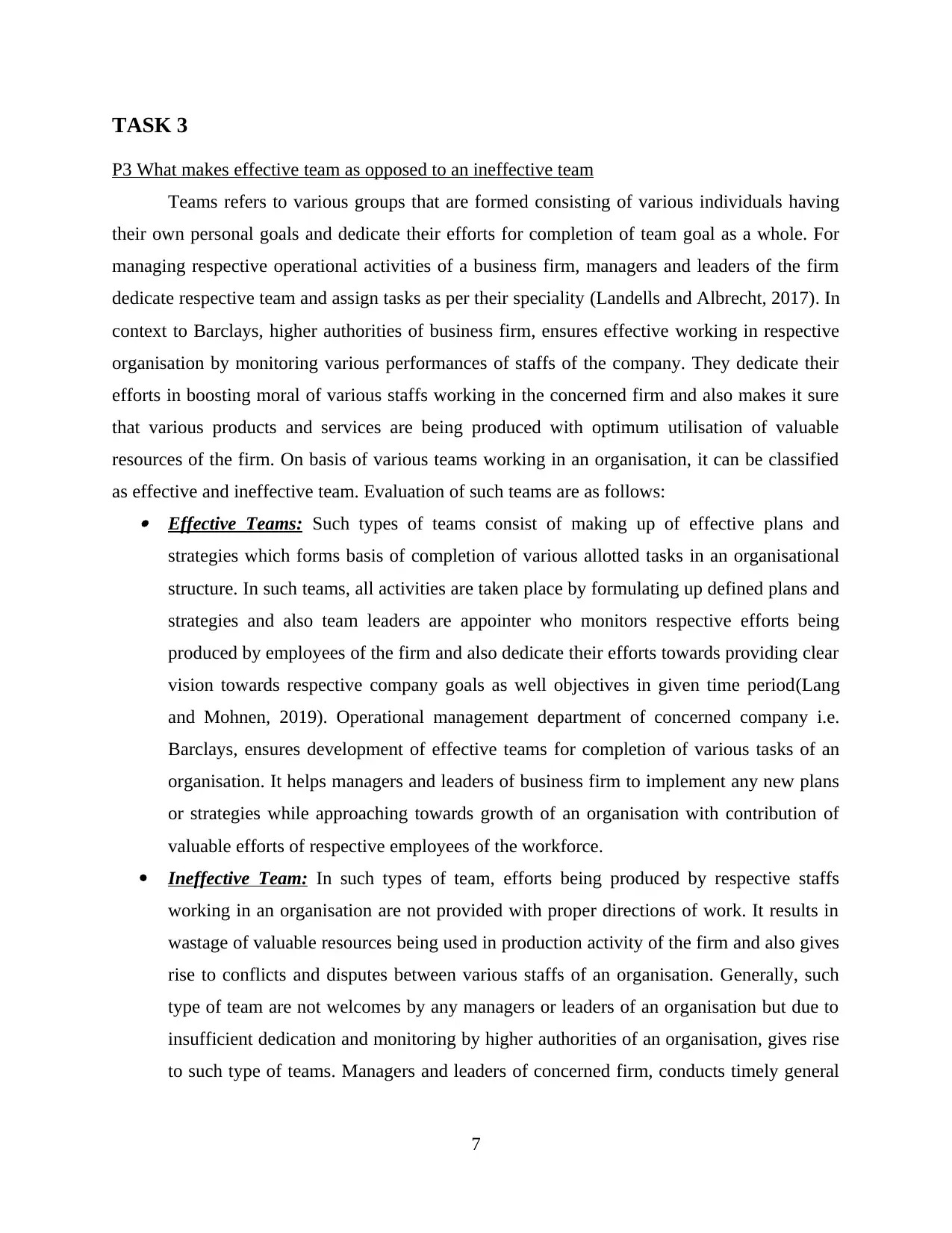
TASK 3
P3 What makes effective team as opposed to an ineffective team
Teams refers to various groups that are formed consisting of various individuals having
their own personal goals and dedicate their efforts for completion of team goal as a whole. For
managing respective operational activities of a business firm, managers and leaders of the firm
dedicate respective team and assign tasks as per their speciality (Landells and Albrecht, 2017). In
context to Barclays, higher authorities of business firm, ensures effective working in respective
organisation by monitoring various performances of staffs of the company. They dedicate their
efforts in boosting moral of various staffs working in the concerned firm and also makes it sure
that various products and services are being produced with optimum utilisation of valuable
resources of the firm. On basis of various teams working in an organisation, it can be classified
as effective and ineffective team. Evaluation of such teams are as follows: Effective Teams: Such types of teams consist of making up of effective plans and
strategies which forms basis of completion of various allotted tasks in an organisational
structure. In such teams, all activities are taken place by formulating up defined plans and
strategies and also team leaders are appointer who monitors respective efforts being
produced by employees of the firm and also dedicate their efforts towards providing clear
vision towards respective company goals as well objectives in given time period(Lang
and Mohnen, 2019). Operational management department of concerned company i.e.
Barclays, ensures development of effective teams for completion of various tasks of an
organisation. It helps managers and leaders of business firm to implement any new plans
or strategies while approaching towards growth of an organisation with contribution of
valuable efforts of respective employees of the workforce.
Ineffective Team: In such types of team, efforts being produced by respective staffs
working in an organisation are not provided with proper directions of work. It results in
wastage of valuable resources being used in production activity of the firm and also gives
rise to conflicts and disputes between various staffs of an organisation. Generally, such
type of team are not welcomes by any managers or leaders of an organisation but due to
insufficient dedication and monitoring by higher authorities of an organisation, gives rise
to such type of teams. Managers and leaders of concerned firm, conducts timely general
7
P3 What makes effective team as opposed to an ineffective team
Teams refers to various groups that are formed consisting of various individuals having
their own personal goals and dedicate their efforts for completion of team goal as a whole. For
managing respective operational activities of a business firm, managers and leaders of the firm
dedicate respective team and assign tasks as per their speciality (Landells and Albrecht, 2017). In
context to Barclays, higher authorities of business firm, ensures effective working in respective
organisation by monitoring various performances of staffs of the company. They dedicate their
efforts in boosting moral of various staffs working in the concerned firm and also makes it sure
that various products and services are being produced with optimum utilisation of valuable
resources of the firm. On basis of various teams working in an organisation, it can be classified
as effective and ineffective team. Evaluation of such teams are as follows: Effective Teams: Such types of teams consist of making up of effective plans and
strategies which forms basis of completion of various allotted tasks in an organisational
structure. In such teams, all activities are taken place by formulating up defined plans and
strategies and also team leaders are appointer who monitors respective efforts being
produced by employees of the firm and also dedicate their efforts towards providing clear
vision towards respective company goals as well objectives in given time period(Lang
and Mohnen, 2019). Operational management department of concerned company i.e.
Barclays, ensures development of effective teams for completion of various tasks of an
organisation. It helps managers and leaders of business firm to implement any new plans
or strategies while approaching towards growth of an organisation with contribution of
valuable efforts of respective employees of the workforce.
Ineffective Team: In such types of team, efforts being produced by respective staffs
working in an organisation are not provided with proper directions of work. It results in
wastage of valuable resources being used in production activity of the firm and also gives
rise to conflicts and disputes between various staffs of an organisation. Generally, such
type of team are not welcomes by any managers or leaders of an organisation but due to
insufficient dedication and monitoring by higher authorities of an organisation, gives rise
to such type of teams. Managers and leaders of concerned firm, conducts timely general
7
Paraphrase This Document
Need a fresh take? Get an instant paraphrase of this document with our AI Paraphraser
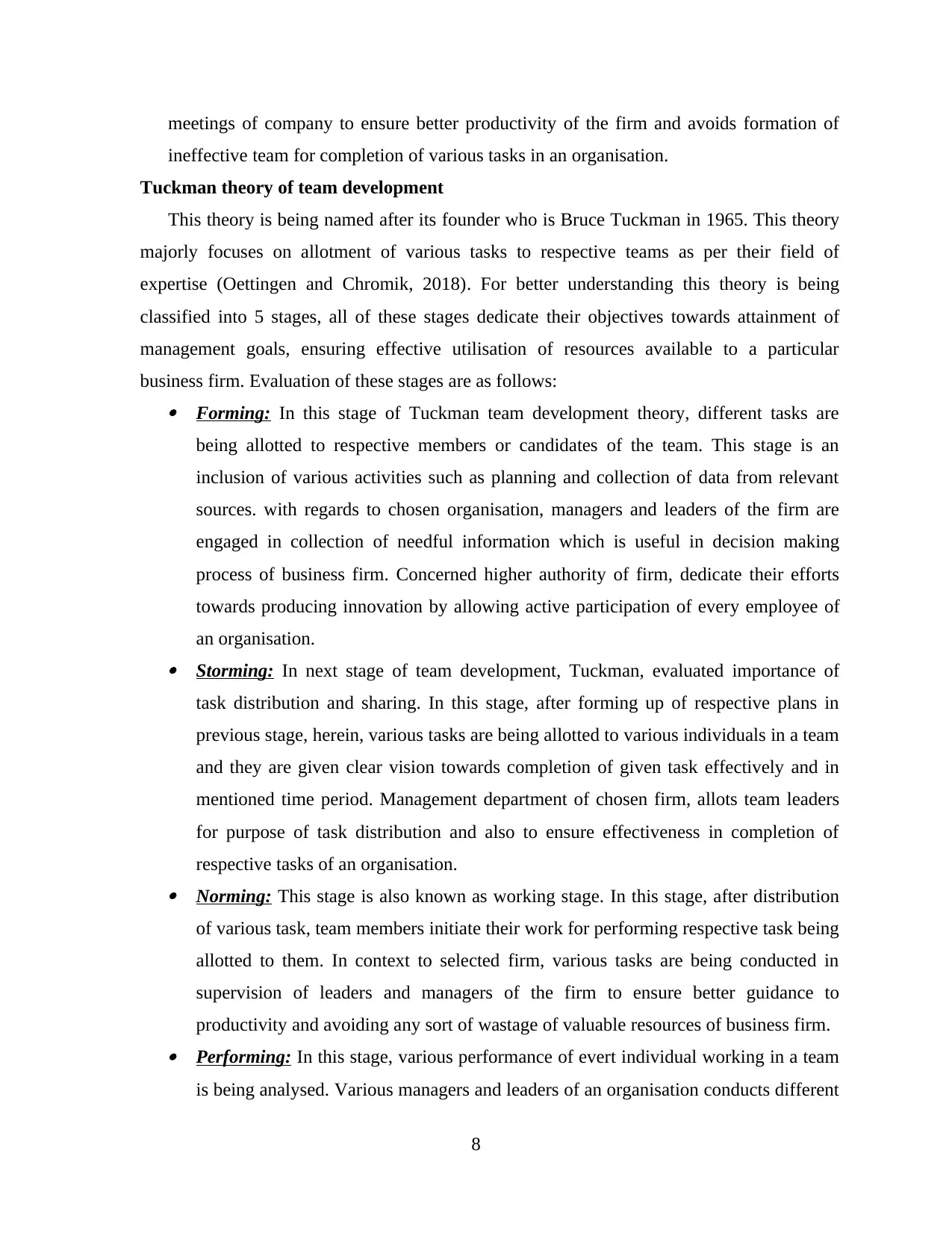
meetings of company to ensure better productivity of the firm and avoids formation of
ineffective team for completion of various tasks in an organisation.
Tuckman theory of team development
This theory is being named after its founder who is Bruce Tuckman in 1965. This theory
majorly focuses on allotment of various tasks to respective teams as per their field of
expertise (Oettingen and Chromik, 2018). For better understanding this theory is being
classified into 5 stages, all of these stages dedicate their objectives towards attainment of
management goals, ensuring effective utilisation of resources available to a particular
business firm. Evaluation of these stages are as follows:
Forming: In this stage of Tuckman team development theory, different tasks are
being allotted to respective members or candidates of the team. This stage is an
inclusion of various activities such as planning and collection of data from relevant
sources. with regards to chosen organisation, managers and leaders of the firm are
engaged in collection of needful information which is useful in decision making
process of business firm. Concerned higher authority of firm, dedicate their efforts
towards producing innovation by allowing active participation of every employee of
an organisation.
Storming: In next stage of team development, Tuckman, evaluated importance of
task distribution and sharing. In this stage, after forming up of respective plans in
previous stage, herein, various tasks are being allotted to various individuals in a team
and they are given clear vision towards completion of given task effectively and in
mentioned time period. Management department of chosen firm, allots team leaders
for purpose of task distribution and also to ensure effectiveness in completion of
respective tasks of an organisation.
Norming: This stage is also known as working stage. In this stage, after distribution
of various task, team members initiate their work for performing respective task being
allotted to them. In context to selected firm, various tasks are being conducted in
supervision of leaders and managers of the firm to ensure better guidance to
productivity and avoiding any sort of wastage of valuable resources of business firm.
Performing: In this stage, various performance of evert individual working in a team
is being analysed. Various managers and leaders of an organisation conducts different
8
ineffective team for completion of various tasks in an organisation.
Tuckman theory of team development
This theory is being named after its founder who is Bruce Tuckman in 1965. This theory
majorly focuses on allotment of various tasks to respective teams as per their field of
expertise (Oettingen and Chromik, 2018). For better understanding this theory is being
classified into 5 stages, all of these stages dedicate their objectives towards attainment of
management goals, ensuring effective utilisation of resources available to a particular
business firm. Evaluation of these stages are as follows:
Forming: In this stage of Tuckman team development theory, different tasks are
being allotted to respective members or candidates of the team. This stage is an
inclusion of various activities such as planning and collection of data from relevant
sources. with regards to chosen organisation, managers and leaders of the firm are
engaged in collection of needful information which is useful in decision making
process of business firm. Concerned higher authority of firm, dedicate their efforts
towards producing innovation by allowing active participation of every employee of
an organisation.
Storming: In next stage of team development, Tuckman, evaluated importance of
task distribution and sharing. In this stage, after forming up of respective plans in
previous stage, herein, various tasks are being allotted to various individuals in a team
and they are given clear vision towards completion of given task effectively and in
mentioned time period. Management department of chosen firm, allots team leaders
for purpose of task distribution and also to ensure effectiveness in completion of
respective tasks of an organisation.
Norming: This stage is also known as working stage. In this stage, after distribution
of various task, team members initiate their work for performing respective task being
allotted to them. In context to selected firm, various tasks are being conducted in
supervision of leaders and managers of the firm to ensure better guidance to
productivity and avoiding any sort of wastage of valuable resources of business firm.
Performing: In this stage, various performance of evert individual working in a team
is being analysed. Various managers and leaders of an organisation conducts different
8
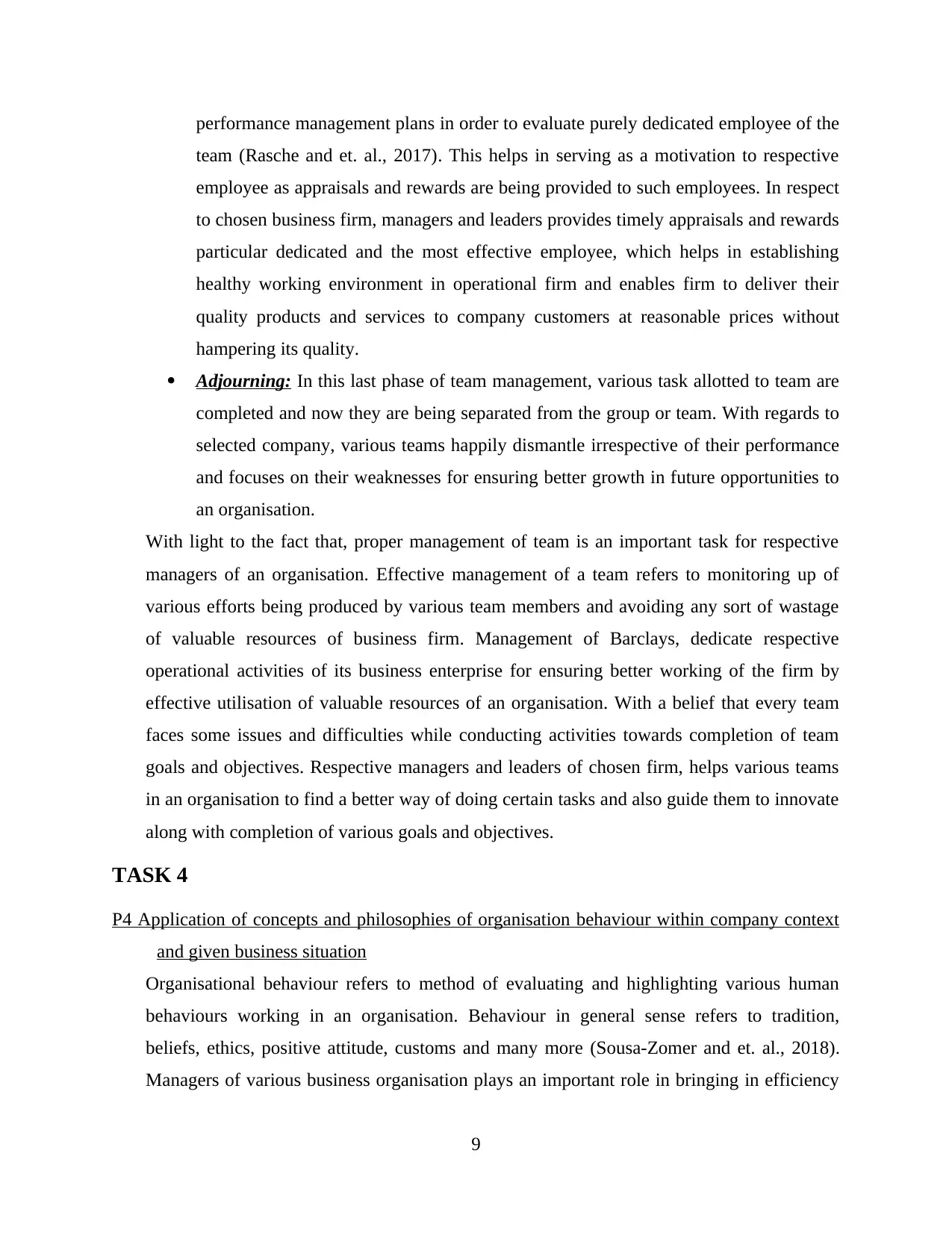
performance management plans in order to evaluate purely dedicated employee of the
team (Rasche and et. al., 2017). This helps in serving as a motivation to respective
employee as appraisals and rewards are being provided to such employees. In respect
to chosen business firm, managers and leaders provides timely appraisals and rewards
particular dedicated and the most effective employee, which helps in establishing
healthy working environment in operational firm and enables firm to deliver their
quality products and services to company customers at reasonable prices without
hampering its quality.
Adjourning: In this last phase of team management, various task allotted to team are
completed and now they are being separated from the group or team. With regards to
selected company, various teams happily dismantle irrespective of their performance
and focuses on their weaknesses for ensuring better growth in future opportunities to
an organisation.
With light to the fact that, proper management of team is an important task for respective
managers of an organisation. Effective management of a team refers to monitoring up of
various efforts being produced by various team members and avoiding any sort of wastage
of valuable resources of business firm. Management of Barclays, dedicate respective
operational activities of its business enterprise for ensuring better working of the firm by
effective utilisation of valuable resources of an organisation. With a belief that every team
faces some issues and difficulties while conducting activities towards completion of team
goals and objectives. Respective managers and leaders of chosen firm, helps various teams
in an organisation to find a better way of doing certain tasks and also guide them to innovate
along with completion of various goals and objectives.
TASK 4
P4 Application of concepts and philosophies of organisation behaviour within company context
and given business situation
Organisational behaviour refers to method of evaluating and highlighting various human
behaviours working in an organisation. Behaviour in general sense refers to tradition,
beliefs, ethics, positive attitude, customs and many more (Sousa-Zomer and et. al., 2018).
Managers of various business organisation plays an important role in bringing in efficiency
9
team (Rasche and et. al., 2017). This helps in serving as a motivation to respective
employee as appraisals and rewards are being provided to such employees. In respect
to chosen business firm, managers and leaders provides timely appraisals and rewards
particular dedicated and the most effective employee, which helps in establishing
healthy working environment in operational firm and enables firm to deliver their
quality products and services to company customers at reasonable prices without
hampering its quality.
Adjourning: In this last phase of team management, various task allotted to team are
completed and now they are being separated from the group or team. With regards to
selected company, various teams happily dismantle irrespective of their performance
and focuses on their weaknesses for ensuring better growth in future opportunities to
an organisation.
With light to the fact that, proper management of team is an important task for respective
managers of an organisation. Effective management of a team refers to monitoring up of
various efforts being produced by various team members and avoiding any sort of wastage
of valuable resources of business firm. Management of Barclays, dedicate respective
operational activities of its business enterprise for ensuring better working of the firm by
effective utilisation of valuable resources of an organisation. With a belief that every team
faces some issues and difficulties while conducting activities towards completion of team
goals and objectives. Respective managers and leaders of chosen firm, helps various teams
in an organisation to find a better way of doing certain tasks and also guide them to innovate
along with completion of various goals and objectives.
TASK 4
P4 Application of concepts and philosophies of organisation behaviour within company context
and given business situation
Organisational behaviour refers to method of evaluating and highlighting various human
behaviours working in an organisation. Behaviour in general sense refers to tradition,
beliefs, ethics, positive attitude, customs and many more (Sousa-Zomer and et. al., 2018).
Managers of various business organisation plays an important role in bringing in efficiency
9
⊘ This is a preview!⊘
Do you want full access?
Subscribe today to unlock all pages.

Trusted by 1+ million students worldwide
1 out of 16
Related Documents
Your All-in-One AI-Powered Toolkit for Academic Success.
+13062052269
info@desklib.com
Available 24*7 on WhatsApp / Email
![[object Object]](/_next/static/media/star-bottom.7253800d.svg)
Unlock your academic potential
Copyright © 2020–2025 A2Z Services. All Rights Reserved. Developed and managed by ZUCOL.





